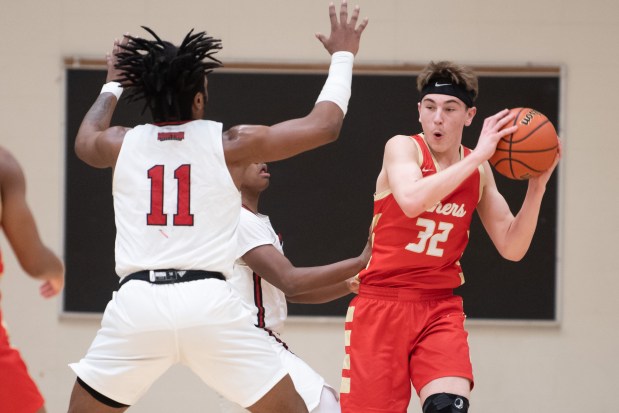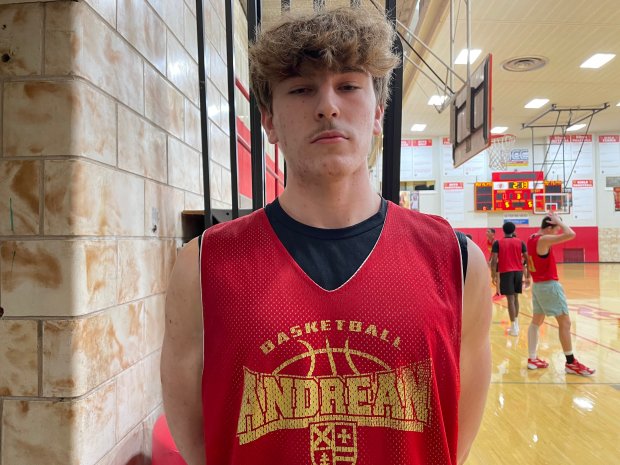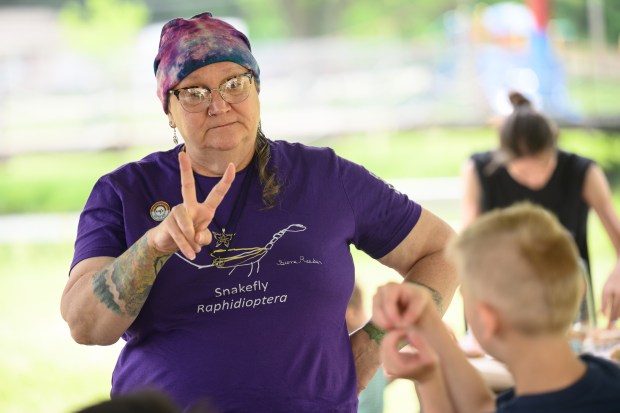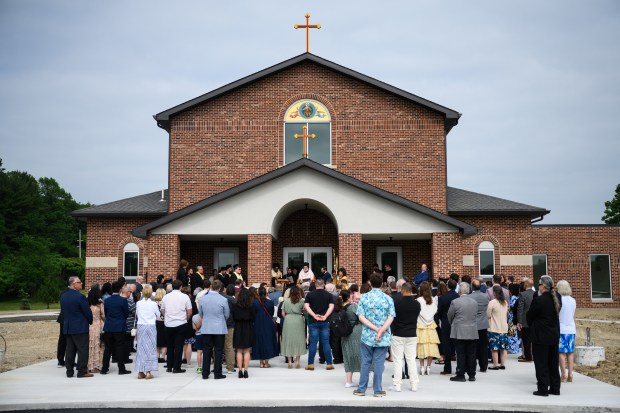Andrean coach Aaron Austin quipped that junior forward Paul Gilvydis would stay in the gym all night if he could.
Gilvydis would put up shots, go to sleep and just wake up the next morning to head to class.
“He’s the hardest-working kid I’ve ever known,” Aaron Austin said. “I’ve been around some kids, they put in a lot of time. But this kid, he’s special.
“A lot of kids think they work hard. Some kids say they love basketball. But he loves it. He just spends hours in the gym, and it’s not even just the time spent. It’s quality time. The extra time he puts in — it could be 30 minutes, 40 minutes — when he’s in here, it’s just total focus.”
The 6-foot-4 Gilvydis typically is the last one to leave after Andrean’s practices. His teammates could be long gone, a girls game could be taking place and he will still be working in the auxiliary gym, according to Aaron Austin.
Senior guard Alex Austin also has noticed Gilvydis’ dedication.
“He’s in the gym all the time,” Alex Austin said. “Every time practice is done, he’s always the only one in the gym. He just puts his headphones on, and he’s just shooting the whole time. No distractions.
“Most of his shots are all net. He shoots for perfection. It makes it easier for me — helps with assists — because when I pass to him, I know it’s going to go in most of the time.”
Gilvydis wasn’t quite sure how he developed that sort of work ethic.
“I just want to be the best,” he said. “I want to win.”
Gilvydis’ efforts have paid dividends for the 59ers (10-8), who will be pursuing their first sectional title since 2019, when they won a Class 2A state championship.
Gilvydis, whose father, also named Paul, played at Purdue from 1993 to 1997 and is an Andrean assistant, was averaging 14.5 points and 7.0 rebounds in mid-January. He scored 32 points, including eight 3-pointers, against Marquette on Jan. 27 and 30 points against Lowell on Feb. 1.
“We’ve given him the green light this year because he puts in the time and he’s earned it,” Aaron Austin said. “Some people want that same opportunity, but they haven’t earned it. He deserves it.
“He’s a total team player. He has an excellent attitude. He’s a kid who never talks back, never responds with negativity. I joke with him that I have to find things to yell at him about because I don’t get to yell at him a lot. So when he does something bad, I really get on him. But it doesn’t bother him at all. He takes constructive criticism better than any kid I’ve seen. No excuses. He wants to be pushed even harder. You can’t be perfect, but he strives for that. He wants to be the best he can be.”
Gilvydis averaged 9.0 points and 2.5 rebounds as a sophomore after playing primarily on the junior varsity team as a freshman.
As he has built up the hours, he said his confidence has grown, along with his abilities.
“I’ve elevated my game in different ways,” Gilvydis said. “Last year, I was more of a shooter. But now I can do a bunch of things on the court. I rebound better, play hard, always diving for the ball. I’m just trying to do the little things.”
Gilvydis tied his improved rebounding to the 20 pounds of muscle he gained since last season. His mother, Jackie (Costanza) Gilvydis, who was a standout tennis player for Munster, is a bodybuilder and trainer and set him on that path.
“You see film of him from last year to this year, it’s like, ‘Wow, big difference,’” Aaron Austin said.
Alex Austin sees it too.
“He used to look little last year,” Alex Austin said. “But he’s been grinding, just grinding every day.”

Paul Gilvydis does it despite having what Aaron Austin described as “really bad knees” throughout high school. Gilvydis said he has Osgood-Schlatter disease and jumper’s knee. He wears braces and gets treatment to manage his conditions.
“My knees are pretty bad, but I just fight through it,” Gilvydis said. “It’s day to day. Some days are worse than others.”
Some days, Aaron Austin said he has to encourage Gilvydis “to go home, ice your knees and relax.”
“He’s never missed a practice,” Aaron Austin said. “Sometimes we have to pull him out of practice because he’s doing too much. But he runs with the group just because he doesn’t want to sit out. He’s the kid in practice, he has the worst knees, but he’s the one diving on the floor for every ball, getting every rebound.
“He’s a great student, a great kid. If I could have 12 of him every year, I would be less stressed. I wouldn’t have to yell as much. I just tell him, ‘Keep doing what you’re doing. Wherever it takes you, it’s going to be something different, something special.’”





